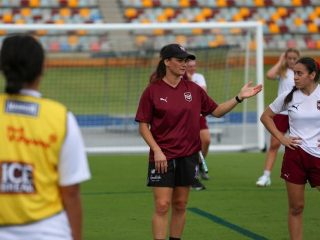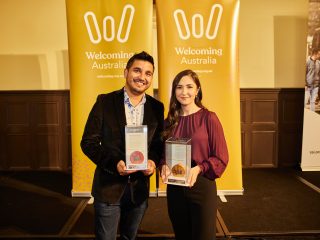Speaking Truth IS Power: from 2016 to now
Seven years ago, I stood in this very room on a similar stage at the Triennial and International Settlement Conference. I was there to share about the launch of Welcoming Cities and noted, in my opening, that the settlement sector had two critical tasks:
- First, ensuring a coordinated, whole-of-community approach to settling people well such that they have equal and supported opportunities to find value and belonging; and,
- Secondly, to grapple with and actively address the reality of continuing to settle people on the unceded lands of First Nations.
Both statements seemed obvious.
In hindsight, I should have anticipated the response I would receive: akin to dropping a match in a pile of dry kindling.
I needed to have understood how disjointed and competitive settlement processes could be. And the migration and settlement sectors’ engagement with First Nations and Peoples, at least in a formal capacity, had been minimal.
Consequently, coordinated approaches continue to drive our work. First Nations engagement also underpins what we do at Welcoming Australia.
I am deeply grateful to Uncle Andrew Gardiner for sharing his local knowledge and to Professor Chelsea Watego for her fierce and intelligent research, discourse and resistance.
More than acknowledgement of country and reconciliation — we actively support and encourage the coming together of Traditional Custodians, local Elders and recently arrived migrants, refugees and people seeking asylum. We actively support the process of voice, treaty and truth. And we encourage our members to actively support localised responses to those processes, addressing past and ongoing injustices, learning to walk behind and take the lead from First Peoples to move forward as a community.
Time and again, and Chelsea spoke to this, we witness the generosity of Aboriginal and Torres Strait Islander people and communities as one of the strongest supporters of refugee and asylum seeker rights because they understand and daily live with the reality and impacts of dispossession.
Their ongoing struggle for sovereignty is aligned with and tied to the rights of people seeking safety and belonging.
Last week, I was in San José, California, to deliver the keynote address to 660 people at Welcoming America’s conference, Welcoming Interactive.
I joined that trip with representatives from four of Welcoming Cities’ member Councils participating in a rural exchange.
We were there to share, learn and explore international perspectives of welcoming and inclusion work and how to continue advancing communities where everyone can belong.
Seven years ago, we couldn’t have conceived this opportunity. Let alone that a contingent of Australians would share leading settlement practices with our American colleagues and peers. Just between us, we’re ahead of the curve.
Over the past seven years, we’ve had the opportunity to witness, learn from and be challenged by exceptional practitioners, policy-makers, researchers and community leaders.
Some have suggested that part of the power of the Symposium is that we platform voices such that they can speak truth to power.
I used to agree.
The phrase, speaking truth to power, is grounded in a history of activism and civil rights. However, it has become something of a cliché. It also implies that people speaking the truth, the truth holders, have no (or less) power.
If the past seven years have taught me anything, speaking truth IS power.
We have witnessed first-hand, and engaged with, some of that power today.
Over the past seven years, we have also learnt that the people closest to the challenges, the people at the so-called grassroots, are also closest to the solutions. Hence, we position and support our members – local councils, sporting codes and clubs, and universities – as facilitators and brokers in their community rather than experts.
The work of welcoming, inclusion and belonging for all requires us to recognise that:
- there is ongoing injustice;
- there are a diversity of migrant stories and experiences; and,
- this work is not just about the story or how you tell it, but whose story it is to tell.
To understand, dismantle and reconstruct who is inviting who to the table and who owns the table to begin with.
In seven years, we have come a long way.
Welcoming Cities now has 74 members representing over 40% of the Australian population.
Welcoming Clubs works with over 100 clubs and 24 sport & recreation-related codes and bodies.
Only soft launched and still very much in its infancy, Welcoming Universities is working with six major Australian Universities representing approximately 181,000 domestic students and 80,000 overseas students (16% of all University students in Australia).
In seven years, Welcoming Australia has grown from an idea and grassroots movement into an organisation that leads and activates the most extensive network for advancing social cohesion nationwide.
Thank you. You are part of this.
This is what we have achieved together.
But we still have much more work to do and cannot afford complacency.
In the face of geopolitical violence, climate change and the visible rise of xenophobia in parts of Europe and the global north – our collective efforts have never been more critical.
Our ‘why’ — communities where everyone can belong — has never been more critical.
The work requires whole-of-community, evidence- and strengths-based approaches.
The work requires:
- knowledge to be shared of leading policy & practice
- relationships to be built
- case studies and resources to be written
- standards & accreditation, and assessment & certification to be advanced.
Consequently, we produce Stories of Welcome – only made available from today – now, up to volume 4. Beautiful and powerful stories of place-based work in communities across this country.
Consequently, we continue to review and improve and are also launching today for public consultation the next iteration of the Welcoming Cities Standard. (You can collect a copy, if you wish, on your way out this afternoon from the registration desk)
This is the work.
The work requires data, frameworks, benchmarks, and networks
You know this work, live it, breathe it, and are represented in it.
But the work is not the ‘why’.
The why is taking people on a journey from fearful to tolerant to welcoming and inclusive.
The why is ensuring that people with lived experience have a say and direct control over the decision-making processes about their lives.
The why are communities where everyone can belong.
And amid the work, the most significant risk is losing sight of the why.
Losing sight of the why means we are distracted from the goal.
Losing sight of the why can lead to working in competition and silos
Losing sight of the why can lead to complacency.
Losing sight of the why profoundly impacts our communities most vulnerable and resilient people – the people closest to the challenges and solutions.
Realising communities where everyone is welcome, included and has a sense of value and belonging is why we do the work.
I want to especially acknowledge and thank my team, who work tirelessly for the ‘why’: Maia, Sebastian, Kate, Loretta, Alexandra, Cate, Turkan, Jude, Bel, Jessica, and Olga. You are all superstars.
This work and why we do it matters.
Your actions matter.
The people you have in mind, the faces you see if I ask who you are working with and for – why you get out of bed to pursue this work – they matter.
Your perseverance matters.
Your leadership matters.
Your words matter.
My challenge to myself, my team and each of you is that we continue to raise and platform the people and stories most impacted by the local and global challenges we face.
My challenge to myself and you is to keep reminding ourselves of the ‘why’ and the ‘who’ and that we actively work together.
If we collectively accept that challenge, imagine what we might achieve in the next seven years and beyond.
We’re officially halfway through the 2023 Welcoming Australia Symposium.
Thank you for your participation, energy and focus.
Thank you for listening, sharing and learning.
See you tomorrow morning, before 9 am, for another challenging and inspiring day.
Thank you.
Delivered by Aleem Ali, CEO of Welcoming Australia, to close Day One of the 2023 Welcoming Australia Symposium.





Leave a Reply